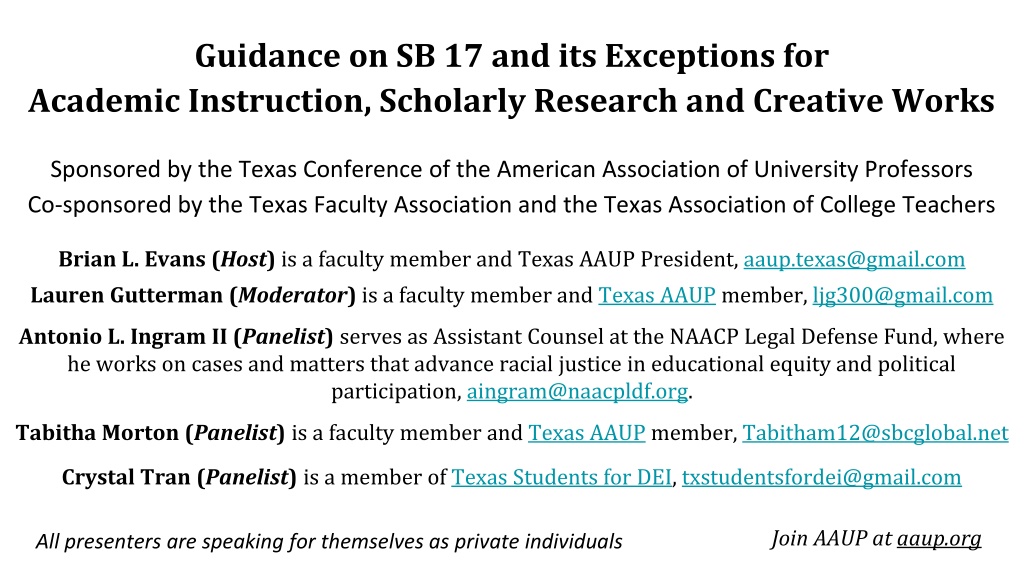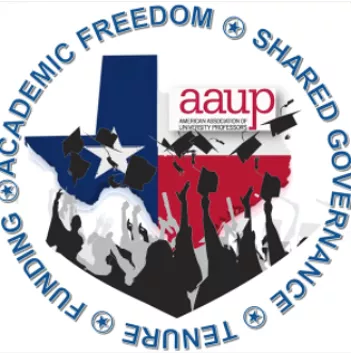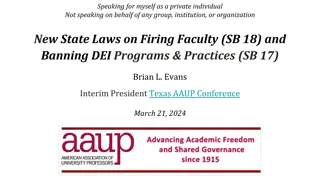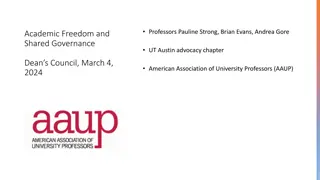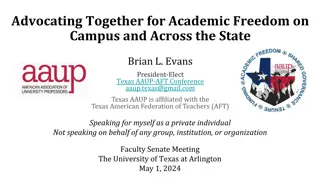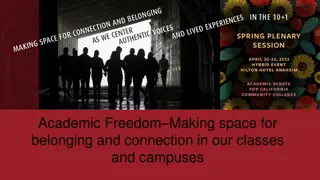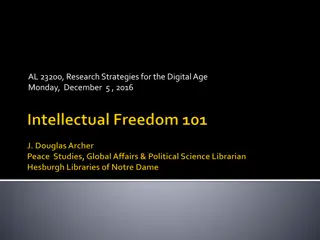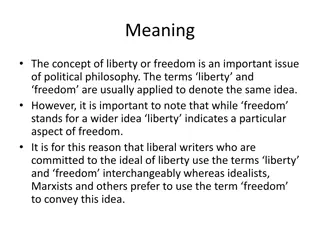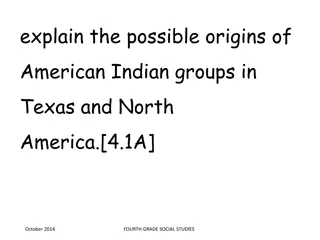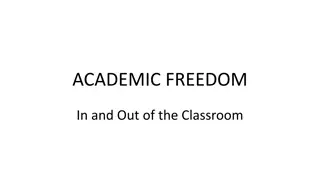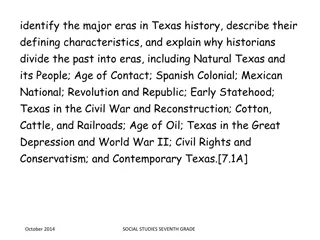Academic Freedom and SB 17: Guidance for Texas Educational Professionals
Explore insights on SB 17 and its exceptions for academic instruction, scholarly research, and creative works provided by prominent figures in the educational field, including the Texas chapter of AAUP. Learn about the significance of academic freedom, shared governance, and the mission of promoting quality education in higher institutions.
Download Presentation

Please find below an Image/Link to download the presentation.
The content on the website is provided AS IS for your information and personal use only. It may not be sold, licensed, or shared on other websites without obtaining consent from the author. Download presentation by click this link. If you encounter any issues during the download, it is possible that the publisher has removed the file from their server.
E N D
Presentation Transcript
Guidance on SB 17 and its Exceptions for Academic Instruction, Scholarly Research and Creative Works Sponsored by the Texas Conference of the American Association of University Professors Co-sponsored by the Texas Faculty Association and the Texas Association of College Teachers Brian L. Evans (Host) is a faculty member and Texas AAUP President, aaup.texas@gmail.com Lauren Gutterman (Moderator) is a faculty member and Texas AAUP member, ljg300@gmail.com Antonio L. Ingram II (Panelist) serves as Assistant Counsel at the NAACP Legal Defense Fund, where he works on cases and matters that advance racial justice in educational equity and political participation, aingram@naacpldf.org. Tabitha Morton (Panelist) is a faculty member and Texas AAUP member, Tabitham12@sbcglobal.net Crystal Tran (Panelist) is a member of Texas Students for DEI, txstudentsfordei@gmail.com Join AAUP at aaup.org All presenters are speaking for themselves as private individuals
All presenters are speaking for themselves as private individuals Guidance on SB 17 and its Exceptions for Academic Instruction, Scholarly Research and Creative Works Lauren Gutterman, PhD, ljg300@gmail.com Secretary, UT Austin AAUP Chapter Social Media Lead, Texas AAUP Conference January 9, 2024
American Association of University Professors (AAUP) Founded in 1915 by faculty and has 45,000 members across the United States. Champions academic freedom, advances shared governance, and organizes all faculty to promote economic security and quality education. Develops standards and procedures to protect academic freedom and ensure shared governance adopted by more than 1500 colleges and universities. Welcomes faculty, researchers, graduate students, academic advisors and other academic professionals as members join at aaup.org. Has members on 75 campuses and chapters at 21 institutions in Texas. Affiliated with American Federation of Teachers (1.7M members including 148,000 professors) on Aug. 1, 2022. Texas AFT has 66,000 members. AFT is part of AFL-CIO.
Academic Freedom In higher education, academic freedom lies at the heart of the free, independent, critical inquiry fundamental to the mission of a college or university Faculty in AAUP and college/university Presidents in American Association of Colleges & Universities jointly formulated academic freedom principles for teachers: [1] freedom to discuss all relevant matters in the classroom freedom to explore all avenues of scholarship, research, and creative expression and to publish the results of such work freedom from institutional censorship or discipline when speaking or writing as participants in the governance of an educational institution freedom from institutional censorship when speaking or writing as a citizen [1] 1940 Statement: https://www.aaup.org/report/1940-statement-principles-academic-freedom-and-tenure
Academic Freedom Academic freedom empowers faculty as well as other teachers and researchers to bring the latest breakthroughs into the classroom innovate in scholarly research and creative endeavors disseminate knowledge for the benefit of society Academic freedom allows teachers to help students develop the critical thinking, knowledge, training, and professional networks needed for successful careers Critical thinking is a required course outcome by THECB. [2] AAUP, Presidents, and Boards of Regents jointly formulated principles for shared governance and due process [3] which are key safeguards of academic freedom [2] Texas Higher Ed. Coordinating Board, Lower Division Academic Course Guide Manual, Spring 2018. [3] 1966 Joint Statement, https://www.aaup.org/report/statement-government-colleges-and-universities
SB17 Bans DEI Programs and Practices (1/3) Defines a diversity, equity, and inclusion (DEI) office per Sec. 1(a) Influencing hiring or employment practices w/r to race, color, ethnicity or sex Promoting differential treatment to individuals on basis of race, color, or ethnicity Promoting policies or procedures w/r to race, color, or ethnicity Conducting trainings, programs, or other activities designed or implemented in reference to race, color, ethnicity, gender identity, or sexual orientation Bans per Sec. 1(b) DEI offices, officers, programs, practices, and trainings Requirement of, or providing preferential treatment for, a DEI statement Preference on basis of race, sex, color, ethnicity, or national origin to an applicant for employment, an employee, or a participant in any function of institution An employee or third party from performing the duties of a DEI office
SB17 Bans DEI Programs and Practices (2/3) Exceptions to ban in Sec 1(d): Academic course instruction Scholarly research or a creative work Student organizations Guest speakers Enhance student academic achievement or postgraduate outcomes that is designed and implemented without regard to race, sex, color, or ethnicity Data collection Student recruitment or admissions When applying for grants or complying with terms for accreditation Can submit a statement highlighting the institution s work in supporting first- generation, low-income, and underserved student populations, per Sec 1(c)
SB17 Bans DEI Programs and Practices (3/3) Penalties for faculty, staff, and contractors per Sec 1(b)(2) Discipline is up to and including termination for any employee or contractor who engages in conduct banned on slide 6 Policies and procedures developed by each Governing Board Institutional compliance and penalties per Sec. 1(e) and 1(h) Institution may not spend State funds each year until Governing Board certifies compliance If a state auditor finds an institution out of compliance, the institution has 180 days to cure the violation If an institution does not get into compliance, institution will lose formula funding increases, institutional enhancements, or exceptional items in the next biennium Student or employee may sue if required to participate in DEI training: Sec. 1(i)
SB17 Key Takeaways Don t do the censors work for them Jeremy C. Young, PEN America SB 17 does not affect course instruction, scholarly research, or creative works! We can and should continue to teach and research about racism, inequality, LGBTQ+ issues, and DEI itself. You should not censor yourself by avoiding teaching material that could be controversial. By doing so we make instructors who cannot avoid these subjects MORE vulnerable. You might consider reminding students at the beginning of the semester that SB 17 does not affect what they can talk or learn about in class. Sample syllabus rider: Texas Senate Bill 17, the recent law that outlaws diversity, equity, and inclusion programs at public colleges and universities in Texas, does not in any way affect content, instruction or discussion in a course at public colleges and universities in Texas. Expectations and academic freedom for teaching and class discussion have not been altered post-SB 17, and students should not feel the need to censor their speech pertaining to topics including race and racism, structural inequality, LGBTQ+ issues, or diversity, equity, and inclusion.
Todays Panelists Lauren Gutterman is a faculty member, and a Texas AAUP member, ljg300@gmail.com. Antonio L. Ingram II serves as Assistant Counsel at the NAACP Legal Defense Fund, where he works on cases and matters that advance racial justice in educational equity and political participation, aingram@naacpldf.org. Crystal Tran is a member of the Texas Students for DEI, txstudentsfordei@gmail.com. Tabitha Morton is a faculty member, and a Texas AAUP member, Tabitham12@sbcglobal.net. All presenters are speaking for themselves as private individuals
